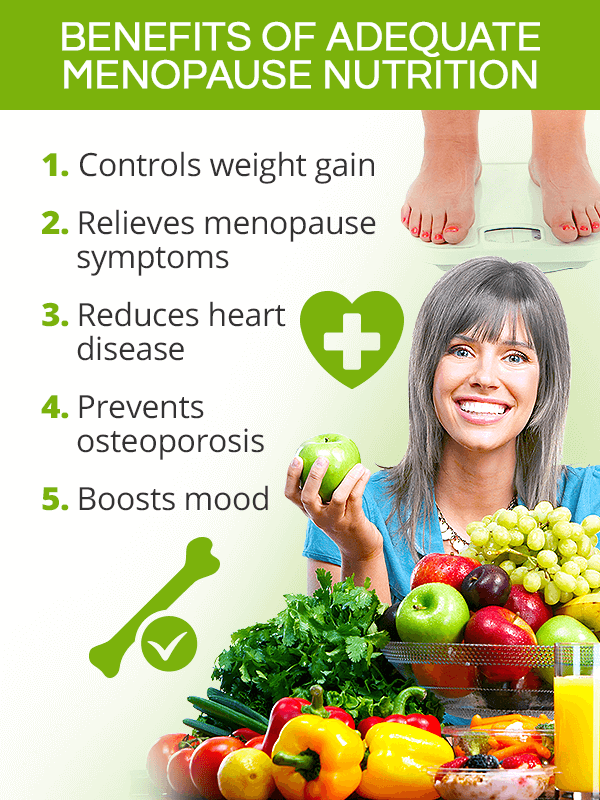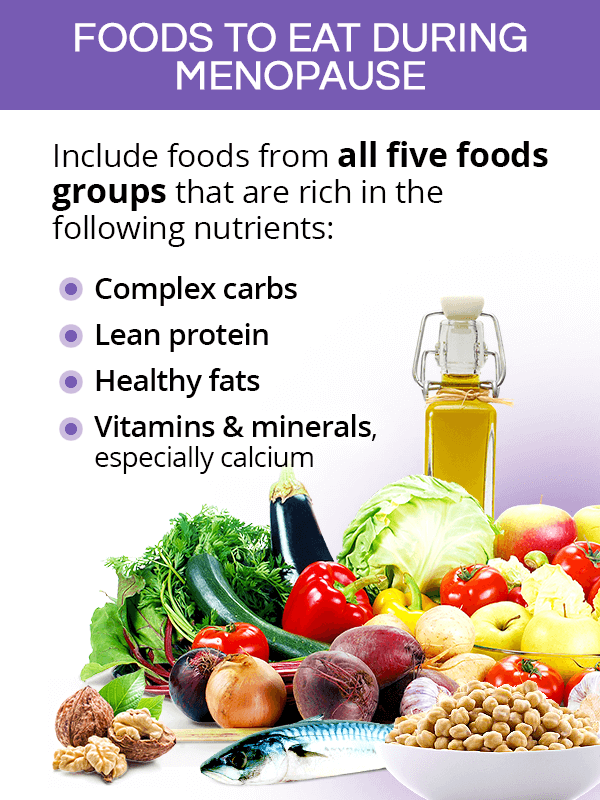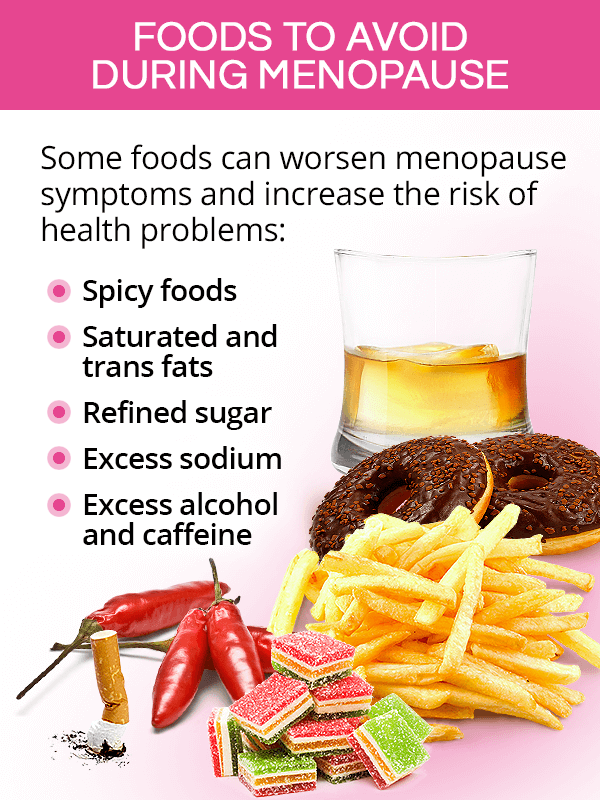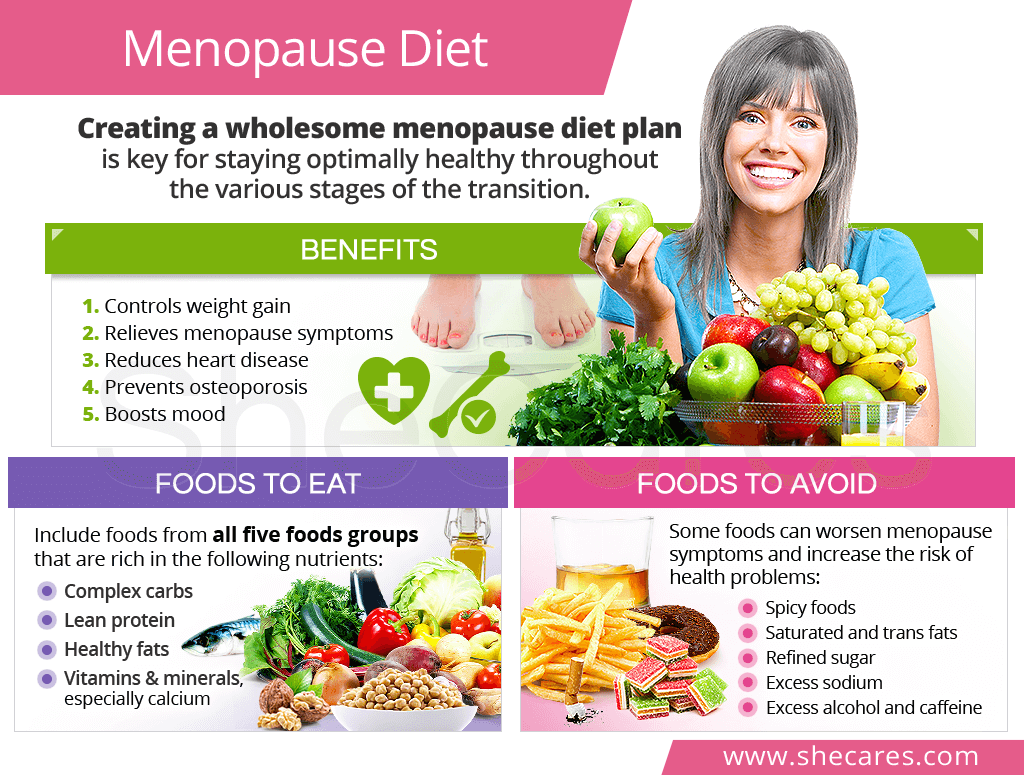Benefits of Adequate Menopause Nutrition

Hormonal changes during menopause affect a number of physiological processes, including how women's bodies digest food, manage stress, repair themselves, and use energy, among others.
Eating nutritionally balanced meals is one of the easiest and most natural ways to counteract those changes throughout the various stages of the menopause transition. Some of the benefits of a nutritious menopause diet are as follows:
Controlling Weight Gain
Due to hormonal shifts that slow down metabolism as well as a higher likelihood of a sedentary lifestyle, menopause weight gain is very common. Luckily, healthy food choices and portion control are the best way to maintain a healthy weight.
Relieving Menopause Symptoms
The foods we eat can help balance hormones or throw them out of whack, worsening menopause symptoms. The right foods can offset digestive problems, such as bloating, strengthen the immune system, tackle allergies, and improve insomnia.
Reducing Heart Disease
After menopause, estrogen drops may lead to abnormal cholesterol levels, higher blood pressure, and unhealthy blood sugar levels. All of them are risk factors for menopause heart disease, which can be counteracted with a balanced menopause diet.
Preventing Osteoporosis
Osteoporosis, characterized by low bone mineral density, affects 30 to 50% of postmenopausal women.1 Food rich in calcium, vitamin D, and magnesium can be greatly beneficial for preserving bone mass and supporting muscle function.
Boosting Mood
Numerous compounds found in food - such as omega-3 fatty acids, tryptophan, and magnesium - play a role in mood regulation. Their adequate intakes can stave off mood swings, irritability, depression, and other psychological difficulties.
In addition, sticking to healthy eating habits can also give women a sense of order, peace, and stability amidst the rapid changes that occur in their bodies during menopause.
Foods to Eat During Menopause

Rather than treating food as one's enemy, a better approach is to use it to one's advantage. This can be done by learning how to choose the foods that the body can use to stay strong and healthy.
Menopause diet should include plenty of water and foods from all five food groups, rich in the following key nutrients:
Complex Carbohydrates
Complex carbs are a key component of menopause diet. Since they take longer to be absorbed in the blood, they do not cause sudden blood sugar spikes. On top of that, dietary fiber regulates digestion and helps maintain a healthy weight.
Fruits, vegetables, and whole grains are great complex carb-rich foods to eat during menopause. As an added bonus, many of them also contain phytoestrogens, estrogen-like compounds that ease hormonal shifts and reduce menopause symptoms.
Lean Protein
Adding adequate amounts of protein to one's menopause diet can help manage muscle mass and bone loss that is common in middle-aged women, thus lowering the risk of fractures and helping women maintain their physical strength.
Good quality protein can be found in animal (e.g., low-fat dairy, fish, and lean meat) and plant-based products (e.g., lentils, chickpeas, and beans). Keep in mind that dairy is also an excellent source of calcium needed for bone health.
Healthy Fats
Under the term “healthy fats” are mono- and polyunsaturated fatty acids, such as omega-3s. They have been shown to offer heart-protective benefits by helping regulate cholesterol levels, which is crucial for menopausal women.
For delicious sources of healthy fats to add to a menopause diet, consider fish, avocados, olive oil, nuts (e.g., walnuts and sacha inchi seeds), and seeds (e.g., chia and flax). Many of them are also rich in hormone-balancing phytoestrogens.
Vitamins & Minerals
By loading their menopause meals with nutritious sources of carbs, protein, and fats, women are likely to ensure adequate intakes of the necessary vitamins and minerals, without the need of supplementation.
The only key change they should keep in mind is that after menopuase, they are recommended to increase their calcium intake from 1,000 mg to 1,200 mg per day.2 Getting enough vitamin D is also key for calcium absorption and mood control.
Foods to Avoid During Menopause

Women may be pleased to find out that the list of foods to avoid during menopause is shorter than what they might have initially thought.
By making wholesome food choices, they will automatically limit their intake of the foods not recommended during menopause. They include the following:
Spicy foods are common triggers of hot flashes and night sweats. Limiting them or taking them out of one's menopause diet plan can help keep some of the symptoms at bay.
Saturated and trans fats have been linked to unhealthy cholesterol levels and heart disease. Replacing them with healthy fats can help prevent potentially serious complications.
Refined sugar should be avoided as it may lead to weight gain as well as deregulate blood sugar levels, increasing the risk of diabetes. Coincidentally, diabetes is an important risk factor for heart disease after menopause.
Sodium - when eaten in excess - can lower bone mineral density and increase blood pressure. Unless otherwise instructed by one's physician, a moderate-sodium diet is usually recommended during menopause.
Alcohol and caffeine do not necessarily have to be taken out of one's lifestyle completely. Rather, women are encouraged to enjoy them in moderation as their excess can worsen their symptoms, such as hot flashes.
Key Takeaways
If eating healthily was not much of a priority throughout reproductive years, entering the menopausal transition is a good time to revamp one's eating habits. Benefits of following a nutritious menopause diet are numerous, including better weight gain control, lower cardiovascular risks, and reduced menopause symptoms, to name a few. A wholesome menopause meal plan is all about choosing nutritious sources of complex carbs, healthy fats, and lean protein as well as avoiding foods that may worse symptoms and increase various health risks, like refined sugar or alcohol. By implementing healthy eating habits early on, they set themselves up for success throughout the menopause transition.
Sources
- Academy of Nutrition and Dietetics. (2019). Eating Right During Menopause. Retrieved April 19, 2021 from https://www.eatright.org/health/wellness/healthy-aging/eating-right-during-menopause
- Clinical Cases in Mineral and Bone Metabolism. (2007). Phytoestrogens: food or drug? Retrieved April 19, 2021 from https://www.ncbi.nlm.nih.gov/pmc/articles/PMC2781234/
- Clinical Obstetrics and Gynecology. (2008). Role of Exercise and Nutrition in Menopause. Retrieved April 19, 2021 from https://journals.lww.com/clinicalobgyn/Abstract/2008/09000/Role_of_Exercise_and_Nutrition_in_Menopause.18.aspx
- Harvard Health Publishing. (2018). Diet might delay - or hasten - the onset of menopause. Retrieved April 19, 2021 from https://www.health.harvard.edu/womens-health/diet-might-delay-or-hasten-the-onset-of-menopause
- International Council on Active Aging. (2017). Nutrition after Menopause - Be your best at every age. Retrieved April 19, 2021 from https://www.icaa.cc/blog/2017-09/Nutrition-After-Menopause-Be-your-best-at-every-age.htm
- Journal of Epidemiology & Community Health. (2018). Dietary intake and age at natural menopause: results from the UK Women's Cohort Study. Retrieved April 19, 2021 from https://jech.bmj.com/content/72/8/733
- Journal of Muscoskeletal & Neuronal Interactions. (2009). Changes in muscle mass and strength after menopause. Retrieved April 19, 2021 from https://pubmed.ncbi.nlm.nih.gov/19949277/
- National Osteoporosis Foundation. (2018). Calcium and Vitamin D. Retrieved April 19, 2021 from https://www.nof.org/patients/treatment/calciumvitamin-d/
- Nutrients. (2013). Magnesium and Osteoporosis: Current State of Knowledge and Future Research Directions. Retrieved April 19, 2021 from https://www.ncbi.nlm.nih.gov/pmc/articles/PMC3775240/
- Menopause. (2015). Caffeine and menopausal symptoms: what is the association? Retrieved April 19, 2021 from https://pubmed.ncbi.nlm.nih.gov/25051286/
- Menopause. (2017). Nutrition & Menopause. Retrieved April 19, 2021 from https://www.menopause.org/docs/default-source/agm/blake-j-2017-slides.pdf
- Osteoporosis International. (2017). High dietary sodium intake is associated with low bone mass in postmenopausal women. Retrieved April 19, 2021 from https://pubmed.ncbi.nlm.nih.gov/28074252/
Footnotes:
- Chronic Disease and Translational Medicine. (2015). Primary osteoporosis in postmenopausal women. Retrieved April 19, 2021 from https://www.ncbi.nlm.nih.gov/pmc/articles/PMC5643776/
- Johns Hopkins Medicine. (n.d.). Staying Healthy After Menopause. Retrieved April 19, 2021 from https://www.hopkinsmedicine.org/health/conditions-and-diseases/staying-healthy-after-menopause
